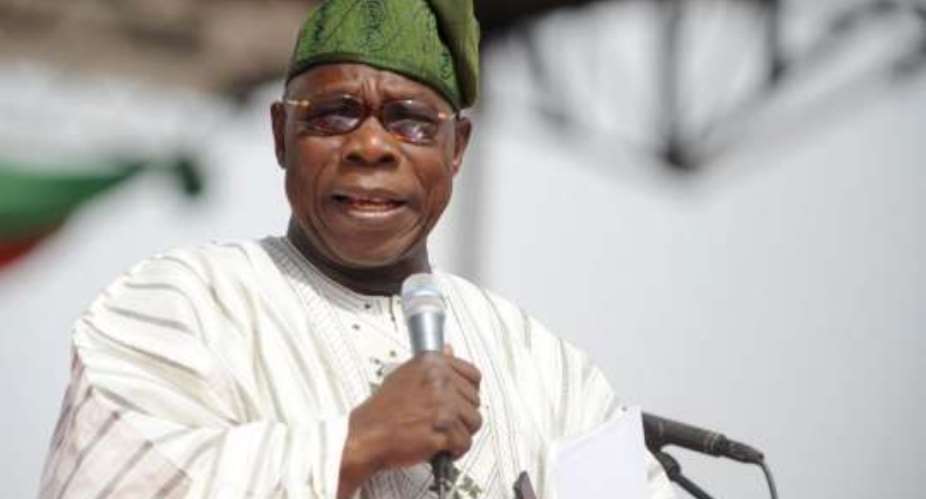From Desmond Davies, Ethiopia
Bahir Dar, Ethiopia, May 3, GNA - Former Nigerian President Olusegun Obasanjo has suggested that bad African leaders should be paid to leave power to save their countries from ruin.
'I can think of a few leaders who we should give money to and let them leave,' he said, adding that they had been causing problems as a result of bad leadership.
Mr Obasanjo who did not give any names was addressing a side event that discussed the African Union's aim of silencing the guns in Africa by 2020 at the 6th Tana Forum on Peace and Security in Africa, in Bahir Dar in Ethiopia last week.
Contributing to a discussion on The Gambia, where the former President Yahya Jammeh, was alleged to have taken millions of dollars when he left Banjul in January for Equatorial Guinea, after losing the December 2016 election, Mr Obasanjo, who is the Chairman of the Tana Forum Advisory Board, said though he was not sure about the money, he agreed to 'let him be', because it was the price The Gambia had to pay for peace and stability.
He said leaders in Africa must accept their responsibilities and lead accordingly, when the issue of bad African leaders had been raised the previous day by the former President of South Africa, Thabo Mbeki, who had said the continent was suffering from 'a leadership deficit'.
He gave the example of how the leaders had failed to stand up for Africa - recounting the AU's plans to intervene in Libya in 2011, which had to be cancelled at the last minute after NATO said that it could not guarantee the safety of African leaders flying to Tripoli on a peace mission.
Mr Mbeki said, that had led to the current chaos in Libya and that, the former US President Barack Obama had regretted NATO's bombing, which led to the removal and killing of Colonel Muammar Gaddafi.
'What does this boil down to?
'Weak leadership in Africa,' he said.
'There is a serious problem of a leadership deficit in Africa.
'What do we do to correct this manifestation?'
Mr Mbeki added: 'We don't have the slightest clue of how to eradicate poverty on the continent.
'What do African leaders do?
'They turn to the World Bank and IMF [International Monetary Fund] who say to them: 'Take our advice or you get nothing at all'.'Mr Imbeki said and added that at times such advice was not in the interest of the continent.
Mr Mbeki suggested that young people should take charge of their own future by fighting against leaders who had failed to provide good leadership.
The President of Uganda, Yoweri Museveni, also claimed that the problem was down to policy mistakes that were made in the 1960s.
He said 'fragmented thinking and fragmented ideologies' were responsible for those mistakes, adding that African leaders were just 'meandering' on while placing the continent at a 'structural disadvantage'.
Though the topic for Forum was 'Natural Resource Governance in Africa', the leadership issue took centre stage because, as one participant put it, 'African leaders are behaving like colonialists who pillaged Africa's resources'.
Professor 'Funmi Olonisakin, the Interim Vice-Rector and founding Director of the African Leadership Centre at King's College in London, said this was the first time that the issue of poor African leadership - a problem that had always been ignored - was being raised.
She said that many leaders and the governing elite in Africa were pursuing their aspirations to live long and well at the expense of the masses.
A Handbook for Economic Success, 'Making Africa Work:, was launched at the Forum.
Authored by Greg Mills, Olusegun Obasanjo, Jeffrey Herbst and Dickie Davis, the book noted: '…so far, it has proven difficult to change the old ways of running Africa's economies.
'The inertia reflects the contemporary retreat of democracy and 'misgovernance' - when government works efficiently, but only for the elite.
It added, 'In this environment, the incentives for liberalising economies are outweighed by the benefits of keeping things just as they are, as elites are easily able to manage and deflect international or other disincentives designed to encourage change.'
GNA





 Avoid pre-registered SIMs, buyer and seller liable for prosecution – Ursula Owus...
Avoid pre-registered SIMs, buyer and seller liable for prosecution – Ursula Owus...
 Election 2024: Mahama has nothing new to offer Ghanaians, Bawumia is the future ...
Election 2024: Mahama has nothing new to offer Ghanaians, Bawumia is the future ...
 OSP files fresh charges against ex- PPA Boss
OSP files fresh charges against ex- PPA Boss
 Withdraw unreasonable GH¢5.8m fine against former board members – ECG tells PURC
Withdraw unreasonable GH¢5.8m fine against former board members – ECG tells PURC
 Akroma mine attack: Over 20 armed robbers injure workers, steal gold at Esaase
Akroma mine attack: Over 20 armed robbers injure workers, steal gold at Esaase
 Those who understand me have embraced hope for the future — Cheddar
Those who understand me have embraced hope for the future — Cheddar
 Ghana will make maiden voyage into space should Bawumia become President — Chair...
Ghana will make maiden voyage into space should Bawumia become President — Chair...
 Train crash: Despite the sabotage, we shall not be deterred and will persevere —...
Train crash: Despite the sabotage, we shall not be deterred and will persevere —...
 Tema-Mpakadan railway project a perversion of the original viable concept design...
Tema-Mpakadan railway project a perversion of the original viable concept design...
 Train crash: Elsewhere, everyone involved in the test will either be fired or re...
Train crash: Elsewhere, everyone involved in the test will either be fired or re...
